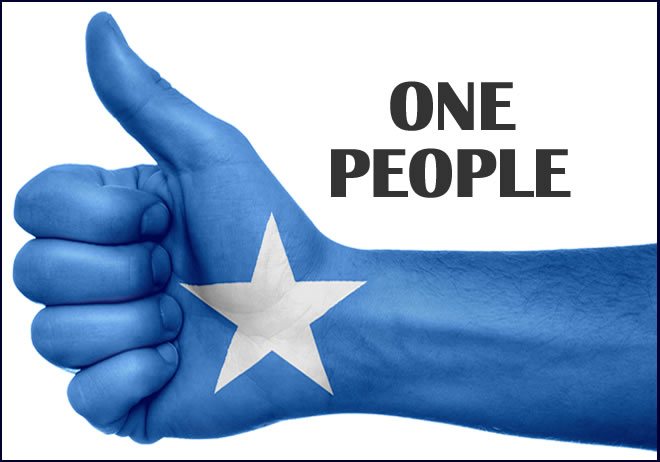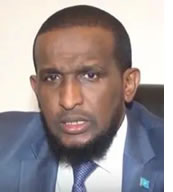
 by Abdulkadir Osoble Ali
by Abdulkadir Osoble Ali
Thursday, June 18, 2020
This is the ontology upon which the Somali nation state was constituted. These are still the tenets which bind us together as Somalis.
Just 60 years ago, we Somalis finally broke free of our colonial shackles and we willingly came together to forge one indivisible union. Our forebears sacrificed long and hard to achieve our freedom. Their legacy is our country, and the belief that we are better and stronger in union together than we are fractured and working apart.
Our forebears well knew our individualistic, independent, feisty and opinionated nature. After long and considered deliberation, they chose representative democracy as the political arrangement that best fitted our cultural personality and disposition.
In the year after our Somali union was formed, all Somalis voted on, and approved a new Somali constitution. In the decade after, two democratic elections were held, in which all Somalis freely voted for the people and party that best represented their interests, and leaders willingly relinquished power.
The first decade of our union was not untroubled though. The institutions of government were new, and everyone was still learning the best way for them to function. At times, there was disquiet and violence which occasionally erupted in different parts of the country. Adapting to change was difficult for some.
Another 30 years have since passed, and more violence, lawlessness, and suffering has ensued. More Somalis have now been born into our anarchic state than those who have memories of safer, better times.
Things have changed though. The world has changed. Somalia and Somalis have changed. We now look to the past with wiser eyes. We see our mistakes. We see the cost incurred. Out of our long darkness and suffering has come an emerging consensus that there is no future in violence, only endless suffering, squandered opportunity and lost potential.
We look to our beginnings anew. One God. One religion. One language. One people. These are the ties that bind. This is our future. We have adapted to our history of missteps, and to new global realities. We have developed a more nuanced system of governance, with regional states ensuring that authoritarianism cannot re-emerge, and ensuring that all Somalis have a voice in the equitable access to scarce resources. We have adapted our democratic model to meet the needs of our past and the challenges of the 21st century. What we need now is the vision and leadership to forge the way forward.
What currently is missing is universal suffrage. One person, One vote. Where all Somalis come together equally to elect representatives that best serve our collective interests. It is ironic for us to discuss whether we can have elections or not in the 21st century, something that others have taken for granted for centuries. Democracy provides a voice for all Somalis, whether they are rich or poor. Democracy provides a platform for debate and agreement as to how scarce resources are shared amongst all Somalis. All are equal when given the chance to vote for individuals to represent them in parliament - the people’s forum.
A forum full of passionate argument, but free of violence intimidation and threat. A forum that can forge consensus and initiate and implement peaceful change, which we all so much desire.
It is time we had elected representatives in all cities, regions, and states in Somalia. It is about time all Somalis had the opportunity to freely exercise their constitutional rights and elect their representatives. The current formula is not working for Somalis - especially young enthusiastic Somalis. They are demanding change and they deserve it. They are demanding full participation in the democratization process of Somalia and they must be given the opportunity to exercise their rights.
To get past where we now are - to renew the very basis of how and why the Somali nation was formed - we need to take our country to fundamentally a new direction; we need free and fair elections; we need an agreed constitution that is voted on by each and every Somali; and, we need an independent judiciary, where justice can be bestowed.
We are not alone. We have many friends internationally who want us to succeed, and who are willing to help lift us up out of our current malaise.
Time and again, our brothers and sisters in Djibouti for example, under the leadership of President Gelle, have come to help Somali leaders resolve their differences. He does so again now. He knows from past experience though that political reconciliation is a long process, and not a momentary photo opportunity. Such processes should include all stakeholders.
My hope is that the meeting in Djibouti between Somalia and Somaliland is the beginning of a new chapter of Somaliness (Somalinimo) in Somalia’s political history.
The world is now moving fast brothers and sisters. We need to run to catch up. Together, we are strong and resilient. Together we can run the marathon for a better future for ourselves and our children.
Abdulkadir Osoble Ali is member of Somali Parliament and the Chairman for Foreign Affairs of the Somali Parliament. He is also the leader of Ilays Party. He can be reached at Email: [email protected]